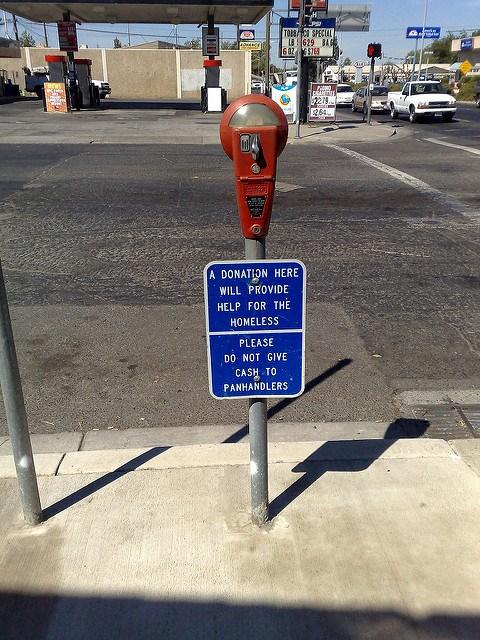
Many cities ban panhandlers from their streets. Others try to regulate within stiff boundaries that threaten heavy fines or jail time for violations.
Bans on panhandling saw a 25 percent spike between 2011 and 2014, according to a report published by the National Law Center on Homelessness and Poverty. The number of laws that restrict panhandling increased by 20 percent during that time.
It's illegal to panhandle on any street in cities like Lincoln, Nebraska; Newark, New Jersey; and Santa Barbara, California. The scenic city of St. Augustine, Florida, meanwhile, imposes such specific geographic limitations on panhandling as to make it almost impossible to memorize the locations in which petitioning for food or money is legal.
But those more aggressive tactics are receiving some pushback these days from advocacy organizations. They argue that it isn't the concept of being asked for assistance that is objectionable to many, but the evidence of poverty and social need.
That's forced some rethinking about ways to reduce the number of panhandlers on streets as homelessness and poverty continue to rise in some areas of the country.
One city that has come up with a kinder approach these days is Paterson, New Jersey. With a population of 146,000 and an unemployment rate that topped 17 percent in recent years, the city is seeking ways to reduce the number of people living and panhandling on its streets.
Its answer doesn't necessarily give panhandlers a free pass -- those picked up for begging are still subject to prosecution -- but they are put in contact with services that may help them address their particular needs. After being fingerprinted, they meet with a social worker, doctor or other aid worker to determine what provisions may be needed, such as food, clothing or access to jobs.
The program is still in its infancy, but since January 2013, the city has seen unemployment drop by more than 9 percentage points, compared to 4.8 points for New Jersey as a whole -- evidence that Paterson's endemic poverty levels may be gradually dropping as well.
But it is Albuquerque, New Mexico's approach that has garnered the most attention recently. The city has its own bylaws to limit what calls "aggressive panhandling" (and at one time enforced even stricter laws to rule out begging on its streets entirely). But it's also made an effort to find more humane ways to improve opportunities for those in need of money and food.
A couple of times a week, a city-funded van rolls through the downtown area offering work to those who need it. At $9 an hour, the work, which usually includes helping out on the city's beautification projects, pays just above minimum wage. It also gives unemployed laborers work, meals, experience and the extra bonus of a moral boost. The program, which started last summer, employs about 10 people per shift.
"You can't legislate people off the corner," says Father Rusty Smith, who runs Albuquerque's St. Martin's Hospitality Center. Father Rusty was one of the instigators of the new program, which is funded through a United Way campaign. Residents can donate to the fund on a website that also serves to connect unemployed individuals with work.
"We wanted to try and create an initiative that would be a little out of the box," explains Albuquerque Mayor Richard Berry, also an outspoken advocate of improving the city's housing options for low-income residents. "Instead of taking the punitive approach and the regulatory approach, why not try something that uplifts everybody?"
Images: 1) Morgan; 2) Mark Hillary
Jan Lee is a former news editor and award-winning editorial writer whose non-fiction and fiction have been published in the U.S., Canada, Mexico, the U.K. and Australia. Her articles and posts can be found on TriplePundit, JustMeans, and her blog, The Multicultural Jew, as well as other publications. She currently splits her residence between the city of Vancouver, British Columbia and the rural farmlands of Idaho.














